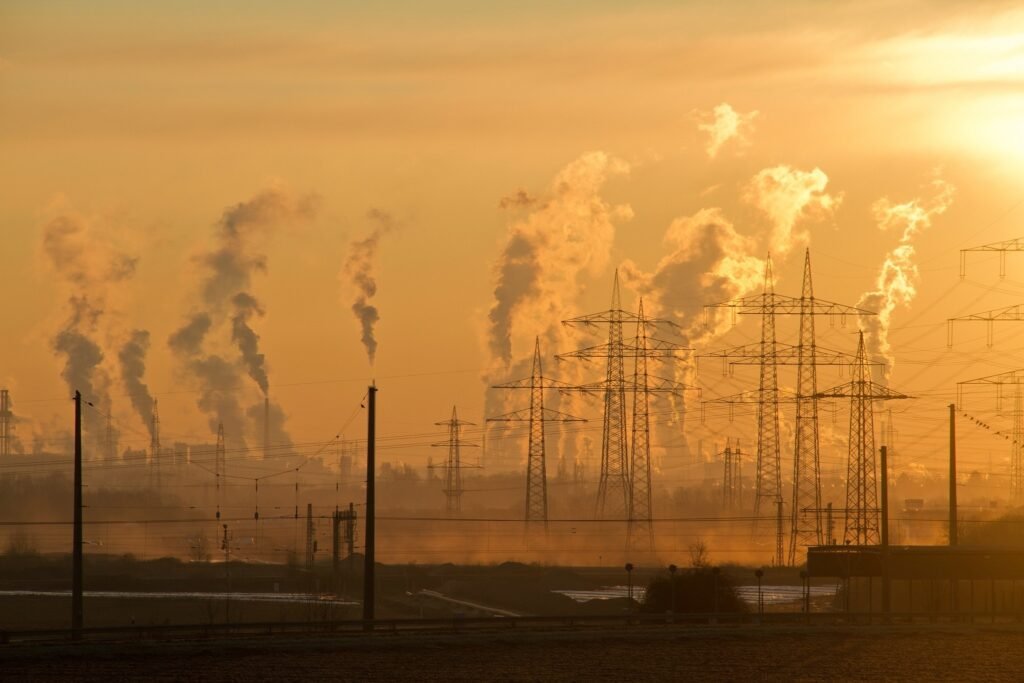Embark on a captivating exploration as we uncover the hidden connection between pollution, stress, and premature aging.
As a specialized dermatologist in anti-aging, I’ve witnessed firsthand how pollution and stress profoundly impact our skin’s health and overall well-being.
Pollution infiltrates our skin, generating harmful free radicals and disrupting collagen production, while stress releases hormones that accelerate aging, impair cellular repair, and trigger inflammation.
This intricate interplay between pollution and stress intensifies their effects, creating a detrimental cycle of oxidative stress that compromises our skin’s well-being.
Join me on this enlightening journey as we delve into scientific evidence, share real-life examples, and provide practical insights to empower you in taking control of your skin’s destiny.
Let’s pave the way to a radiant and age-defying future together.
Some of the links in this post are affiliate links. This means if you click on the link and purchase the item, I will receive an affiliate commision at no extra cost to you. All opinions remain my own. Read more on our Privacy Policy page
What Types Of Foods Cause Premature Aging?
The Effects of Pollution on Aging

Pollution Overview and Sources
Pollution, stemming from sources like vehicle emissions, industrial waste, and airborne particles, poses a significant threat to both our general health and skin. Air pollution permeates urban environments, while water pollution arises from industrial and agricultural runoff. Understanding the sources and pervasive nature of pollution is crucial to comprehending its impact on aging.
Pollution’s Impact on the Skin
Free Radicals and Oxidative Stress
Pollution releases free radicals, unstable molecules that disrupt the balance within our skin cells. These free radicals induce oxidative stress, triggering inflammation, collagen breakdown, and impairment of the skin’s natural defense mechanisms. Diesel exhaust and cigarette smoke are notable contributors to free radical production.
Collagen Disruption and Skin Elasticity
Collagen, responsible for skin structure and elasticity, can be significantly affected by pollution. Air pollutants combined with ultraviolet (UV) radiation accelerate collagen degradation. Additionally, pollution particles can infiltrate the skin, provoking an immune response that further hampers collagen production and contributes to premature aging.

Pollution’s Role in Accelerating the Aging Process
Inflammation and Chronic Skin Conditions
Particulate matter (PM) found in pollution can penetrate the skin, triggering inflammation and exacerbating skin conditions like acne, eczema, and psoriasis. Inflammatory mediators released during pollution-induced inflammation compromise the skin’s barrier function and its ability to repair and renew itself.
Premature Development of Wrinkles, Age Spots, and Uneven Skin Tone
Pollution’s impact on collagen and elastin fibers leads to the premature appearance of visible aging signs. Oxidative stress and inflammation degrade these crucial components of the skin’s support system, resulting in wrinkles, fine lines, and loss of elasticity. Additionally, pollution can disrupt melanocytes, causing the formation of age spots and uneven skin tone.
Supporting Evidence: Case Studies and Scientific Research
Multiple studies reinforce the link between pollution and premature aging. Long-term exposure to air pollution correlates with increased severity of wrinkles and age spots. Research also reveals that individuals residing in highly polluted urban areas exhibit reduced skin elasticity and hydration.
Scientific investigations utilizing human or animal models have elucidated the underlying mechanisms of pollution-induced aging. These studies unveil specific signaling pathways, pro-inflammatory mediator release, and disruption of the skin’s barrier function in response to pollution.
5 Ways to naturally Boost Collagen Production for Youthful Skin
the Impact of Stress on Aging

Stress: Introduction and Physiological Effects
Stress, a physiological response to external or internal pressures, profoundly impacts the aging process. By exploring stress and its consequences, we gain insight into its role in premature aging.
Stress Hormones and Aging
Cortisol’s Effects on the Skin and Organs
Cortisol, the “stress hormone,” released by the adrenal glands during stress, exerts detrimental effects on the skin and organs. Elevated cortisol compromises the skin’s barrier function, impairs collagen synthesis, and reduces skin hydration, hastening aging. Moreover, weakened immunity caused by cortisol increases susceptibility to skin infections and disorders.
Telomeres and Stress-Induced Aging
Chronic stress and high cortisol levels accelerate telomere shortening, which safeguards genetic information during cell division. Stress-induced telomere attrition contributes to cellular aging, impacting overall health and skin appearance.
Psychological and Behavioral Effects of Stress on Aging

Sleep Disturbances and Cellular Repair
Stress disrupts sleep patterns, hindering the restorative functions crucial for cellular repair and rejuvenation. Inadequate sleep impairs the skin’s ability to heal, leading to dull and aged-looking skin.
Impact on Aging-Related Lifestyle Choices
Stress often triggers unhealthy lifestyle choices such as poor diet, sedentary behavior, and substance abuse. These behaviors expedite the aging process. Stress-driven dietary deficiencies and inflammation harm skin health. Sedentary habits decrease circulation and muscle tone, accelerating aging. Excessive alcohol consumption and smoking damage the skin’s structure and regenerative capacity.
Scientific Evidence Linking Stress and Premature Aging
Scientific research consistently supports the connection between chronic stress and premature aging. Studies demonstrate associations between high stress levels and visible signs of aging like wrinkles, uneven skin tone, and reduced elasticity. Molecular investigations identify stress-related pathways impacting cellular aging and skin health, cementing the scientific basis of stress-induced aging.
What You Need to Know About Anti-Aging Supplements: A Comprehensive Guide
The Synergistic Effect: Pollution, Stress, and Premature Aging

Exploring the Interplay Between Pollution and Stress
The dynamic interplay between pollution and stress is key to understanding their combined impact on premature aging. These two factors intertwine, creating a synergistic relationship that accelerates the aging process and exacerbates their individual effects.
How Pollution Exacerbates the Effects of Stress on Aging
Increased Inflammation and Oxidative Stress
When pollution and stress coexist, the skin experiences a heightened inflammatory response. Pollution particles, such as particulate matter (PM), trigger inflammation, while stress hormones further amplify this response. The result is increased inflammation and oxidative stress, which contribute to accelerated aging processes like collagen degradation, DNA damage, and impaired cellular function.
Impaired Stress Response and Cellular Repair Mechanisms
Stress disrupts the body’s ability to mount an effective stress response, leading to prolonged periods of elevated stress hormone levels. In the presence of pollution, the stress response system becomes further compromised. Elevated stress hormones, such as cortisol, hinder the skin’s natural repair and regeneration processes. Pollution-induced inflammation and oxidative stress overload the cellular repair mechanisms, impairing the skin’s ability to recover and rejuvenate. This impairment of the stress response and cellular repair mechanisms contributes to premature aging.
Real-Life Examples or Case Studies Illustrating the Combined Impact of Pollution and Stress on Premature Aging
Examining real-life examples and case studies vividly demonstrates the detrimental effects of pollution and stress on premature aging. These studies highlight individuals living in urban environments with high pollution levels and chronic stress. The findings reveal visible signs of accelerated aging, such as increased wrinkle formation, skin discoloration, and loss of elasticity.
For instance, research has shown that individuals exposed to high levels of air pollution in conjunction with chronic stress experience more pronounced skin aging compared to those with lower pollution exposure and stress levels. Objective measures, including skin assessments, clinical evaluations, and advanced imaging techniques, provide quantifiable evidence of the combined impact of pollution and stress on premature aging.
Effective Strategies for Mitigating the Effects of Pollution and Stress on Aging

Lifestyle Adjustments to Reduce Pollution Exposure
Enhance Indoor Air Quality through Air Purification
Improve the air you breathe by implementing air purification systems and employing efficient filtering techniques. High-efficiency particulate air (HEPA) filters effectively capture airborne pollutants and allergens, ensuring cleaner indoor air. Additionally, ensure proper ventilation and regular maintenance of HVAC systems to prevent the accumulation of pollutants indoors.
Opt for Filtered Water Sources to Minimize Contaminant Intake
Protect yourself from waterborne contaminants by utilizing water filtration systems or opting for filtered water sources. Consider methods like activated carbon filters or reverse osmosis systems to eliminate impurities, chemicals, and heavy metals, promoting safer drinking water.

Stress Management Strategies to Counteract Premature Aging
Embrace Mindfulness and Relaxation Practices for Stress Reduction
Incorporate mindfulness and relaxation techniques into your daily routine to effectively manage stress levels. Engage in meditation, deep breathing exercises, or progressive muscle relaxation to promote a sense of calm and inner balance, reducing the physiological and psychological impacts of stress.
Cultivate a Regular Exercise Routine for Stress Relief
Make physical activity a priority to combat stress and promote overall well-being. Find activities that bring you joy and engage in them regularly, whether it’s brisk walking, jogging, dancing, or practicing yoga. Regular exercise releases endorphins, improves mood, and provides an outlet for stress reduction.

Skincare and Dietary Recommendations to Counteract Pollution and Stress Effects
Nourish Your Skin with an Antioxidant-Rich Diet
Support your skin’s health by adopting an antioxidant-rich diet that includes a variety of fruits, vegetables, nuts, seeds, and whole grains. These natural sources provide essential antioxidants like vitamins C and E, beta-carotene, and resveratrol, which help neutralize harmful free radicals caused by pollution and stress.
Establish a Skincare Routine Focused on Pollution Protection and Stress Reduction
Tailor your skincare routine to address the damaging effects of pollution and stress on the skin. Choose products that contain potent antioxidants, such as vitamin C or green tea extract, to combat free radicals and promote skin rejuvenation. Use gentle cleansers to remove pollutants without stripping the skin’s natural barrier, and regularly moisturize to maintain hydration and strengthen the skin’s resilience.
By making lifestyle adjustments to reduce pollution exposure, implementing effective stress management techniques, and adopting skincare and dietary practices that counteract the effects of pollution and stress, you can mitigate the impact of these factors on premature aging. Remember, taking a holistic approach and customizing your strategies to fit your needs will contribute to healthier and more resilient aging.
Experience the transformative benefits of drinking 2-3 liters of water from SLIMCRYSTAL bottles daily.
Enhance weight loss, digestion, energy levels, and promote overall health and youthfulness. Harness the power of crystal healing used by experts for decades and change your life for the better.
Don’t miss out, order your SLIMCRYSTAL bottle today!

Conclusion
In conclusion, pollution and stress significantly contribute to premature aging.
By comprehending their individual impacts and recognizing the synergistic relationship between them, we can implement lifestyle modifications, stress management techniques, and skincare practices to counteract their detrimental effects.
Promoting awareness, taking proactive measures, and supporting ongoing research efforts will empower us to address the challenges of premature aging and strive for healthier, more resilient skin in the face of environmental factors.

FAQs
How does pollution contribute to premature aging?
Pollution accelerates premature aging by releasing harmful substances and free radicals into the air. These pollutants cause oxidative stress and inflammation in the skin, leading to collagen damage, accelerated aging processes, and the development of wrinkles, age spots, and uneven skin tone.
Can stress really impact the aging process?
Absolutely. Chronic stress triggers the release of stress hormones like cortisol, which disrupt the body’s natural repair mechanisms. Elevated cortisol levels contribute to collagen breakdown, impaired cellular function, and the appearance of premature aging signs such as wrinkles and loss of elasticity.
How can I reduce my exposure to pollution?
To minimize pollution exposure, consider using air purification systems at home and avoiding highly polluted areas when possible. Use water filtration methods to ensure cleaner drinking water. Additionally, wearing protective clothing and using skincare products with SPF can create a barrier between your skin and pollutants.
What are some effective stress management techniques for combating premature aging?
Incorporating mindfulness practices like meditation, deep breathing exercises, and relaxation techniques can help manage stress levels. Engaging in regular physical activity, adopting a healthy lifestyle, and prioritizing quality sleep also contribute to stress reduction and overall well-being.
Are there specific skincare products or routines that can counteract the effects of pollution and stress on the skin?
Yes, incorporating antioxidant-rich skincare products can neutralize free radicals caused by pollution. Look for ingredients like vitamin C or green tea extract. Maintaining a consistent skincare routine with gentle cleansers and moisturizers helps protect and nourish the skin while promoting its resilience against pollution and stress.






